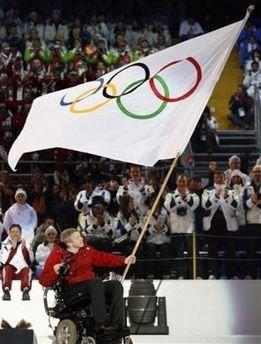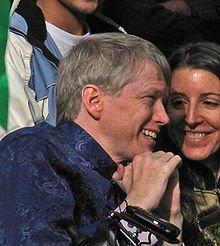After spending seven years recovering from a traumatic and disabling accident I reached a turning point in my life through sport. Murder Ball was the name of a sport for quadriplegics. Because my disability was more severe than that of the other players I had to recognize that I was not an asset to the team. But I became immersed in the competitive spirit which I found extremely healthy and which spilled into other areas of my life. Eventually I found a role which made me valuable. I would get my foot pedals in the spokes of one of their better players thereby keeping them away from the action. By tipping the scales my team started to win. Eventually I found another role where I could contribute -- fundraising and organization. This early discovery would lead my life in interesting directions.
I have a particular interest in individual sports. I have helped organize sailing for people with disabilities and helped invent a device to go hiking in rugged terrain. The Trailrider can only be operated with the help of two or more able-bodied people. It has been used to climb to the top of Mount Kilimanjaro and the base camp of Mount Everest and has fostered many lasting relationships. I was actually surprised by how letting others feel a sense of responsibility for my well-being could be a very bonding experience.
Sport for people with disabilities has been responsible for changing attitudes of the general public. People can relate to athletic achievement and the cultivation of sport heroes has helped make the general public feel a human connection and identification with people with disabilities. This attitude is a vital precondition to social change at the level of government policy. The Paralympic Games change every country that hosts them. I remember Italian mayors telling me how their Paralympic Games had opened a window for new policies of access and inclusion. The Games had reached a critical mass to gain the attention of the general public. Their connection with the Olympics has been very helpful in achieving this.
The Paralympic Games have already changed Vancouver and British Columbia. Many decisions have been made to improve access and inclusion, overcoming political hurdles because of the knowledge that the world would be arriving and scrutinizing our achievements. The Measuring Up Program has encouraged communities to reevaluate themselves and recognize shortcomings and opportunities.

Sport and disability and belonging are intimately connected. The more we recognize this the greater the chance that we will get the most out of the opportunity. The responsibility is ours.


 Sam Sullivan is CEO Global Civic Policy Society and former Mayor City of Vancouver. Here with Lynn Zanatta.
Sam Sullivan is CEO Global Civic Policy Society and former Mayor City of Vancouver. Here with Lynn Zanatta. The editor of L'Encyclopédie de L'Agora and well known newspaper chronicler and philosopher, analyses actuality through the looking glass of Belonging.
The editor of L'Encyclopédie de L'Agora and well known newspaper chronicler and philosopher, analyses actuality through the looking glass of Belonging.